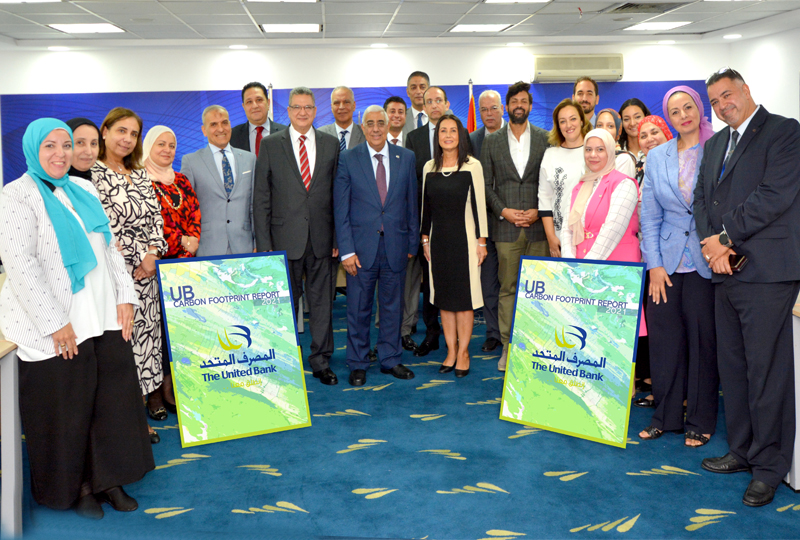The United Bank issues the first report to measure the carbon foot print
03/10/2022

The United Bank issues the first report to measure the carbon foot print
- The Egyptian state and CBE adopt an approach to reduce thermal emissions.
- 10 international standards implemented by The United Bank report to measure the carbon foot print.
- The huge national projects contribute to curb climate change negative impacts.
- Raising awareness for the importance of reducing thermal emissions supports The United Nations principles practice.
- Fin Tech boosts to reduce carbon emissions plans.
- The United Bank youth participation in applying the report 10 standards is the best guarantee for green sustainable economy principles.
Cairo: 3rd of October, 2022
The United Bank announced the first carbon footprint report issuance in its headquarters, that’s in the framework of The Egyptian state and The Central Bank of Egypt approach towards applying green economy to achieve sustainable development as per 2030 vision, and limiting the adverse impacts of climate change to pave the way to the COP 27 next month.
The report was prepared by UB sustainable finance sector. It included the generic outlines of the plan and sustainable investments programs as per UB strategy framework towards sustainable green finance, according to CBE requisites and as an application to the fifth principle of CBE guidelines, and also, as an implementation of the ecologic footprint axis mentioned in the sustainable finance committee of Federation of Egyptian Banks.
The carbon footprint report includes a detailed measurement process to UB’s practices on two phases:
1/ The First Phase: Direct Emissions- produced by burning fuels, gas leakage and cooling.
2/ The Second Phase: In-direct Emissions- produced by power purchase, supply chain, water consumption, and waste management.
This report led to setting a work plan and activation of number of programs which contribute, either directly or in-directly, to reducing carbon emissions produced by operating practices in UB, that include 10 standards:
- A carbon emissions periodic measurement. Through programs applied firstly in the headquarters. To pave the way to measure in all UB branches.
- Depending on renewable energy resources- as a safe alternative, in order limit the negative impacts of global warming gases emissions. That is being applied in the present in the national huge projects. Like: 5th generation cities (The New Capital, New Alamien, New Mansoura). These applications expand working with clean energy usages. Like: solar heaters smart lightening systems, pre- paid electricity meters, those applications are all boosting the rationalizing energy consumption practices.
- Raising electricity and energy efficiency.
- Periodic maintenance to reduce cooling gas leakage.
- Waste management and recycling.
- Depending on green supply chains.
- Green building applications- ecofriendly, as for water and energy usage, atmosphere, resources and internal environment quality preservation. As well as, using non harmful materials.
- Setting sustainability polices for the institutions and agencies, derived from the Egyptian state polices.
- Building youth capabilities to guarantee continuing the growth of sustainable development applications and maximize its vital role.
The report highlights the importance of raising the citizen’s awareness to face climate change, and the community role will have a big impact on curbing the harmful impacts of climate change.
As well as, the FIN-Tech has a great role in limiting the carbon footprint emissions, through replacement of traditional banking transactions with digital applications, which serve the citizen in the first place, the state policy and CBE.
End


